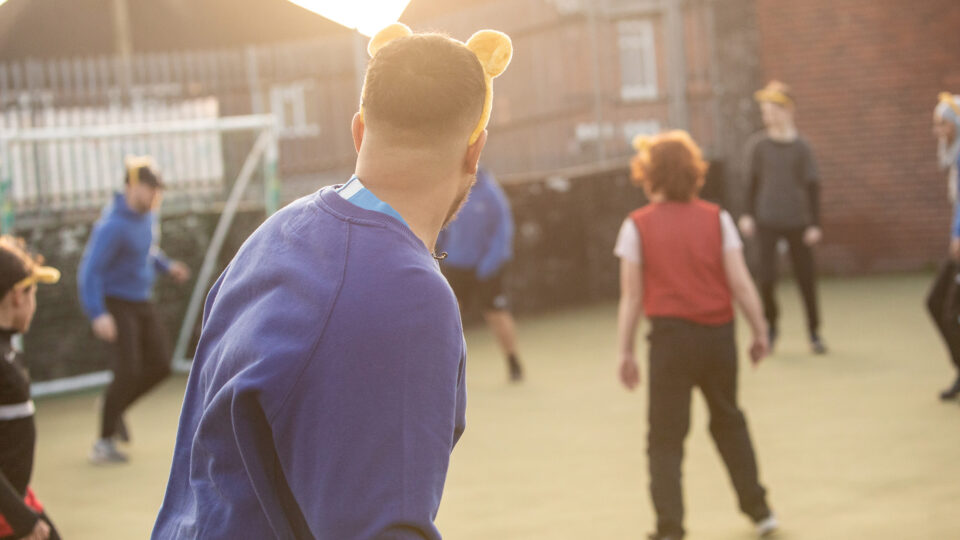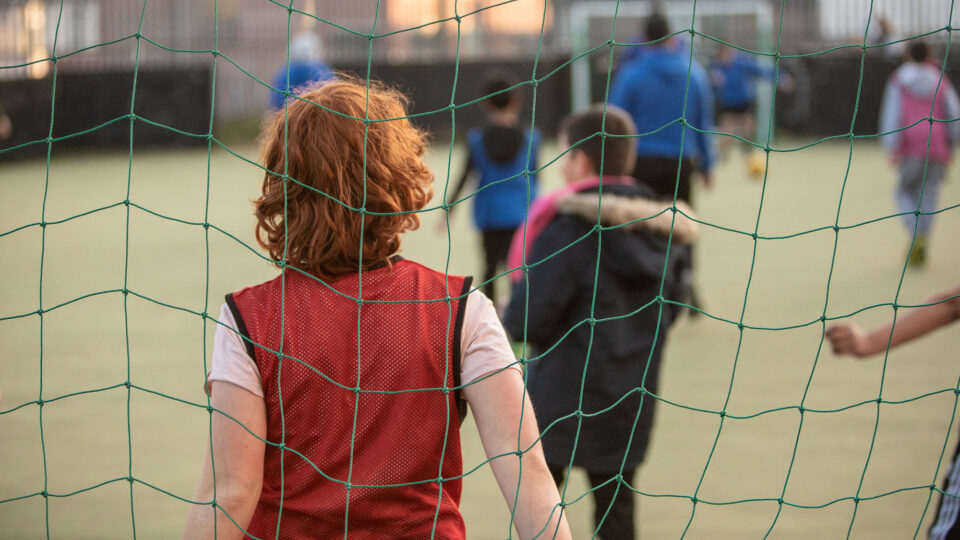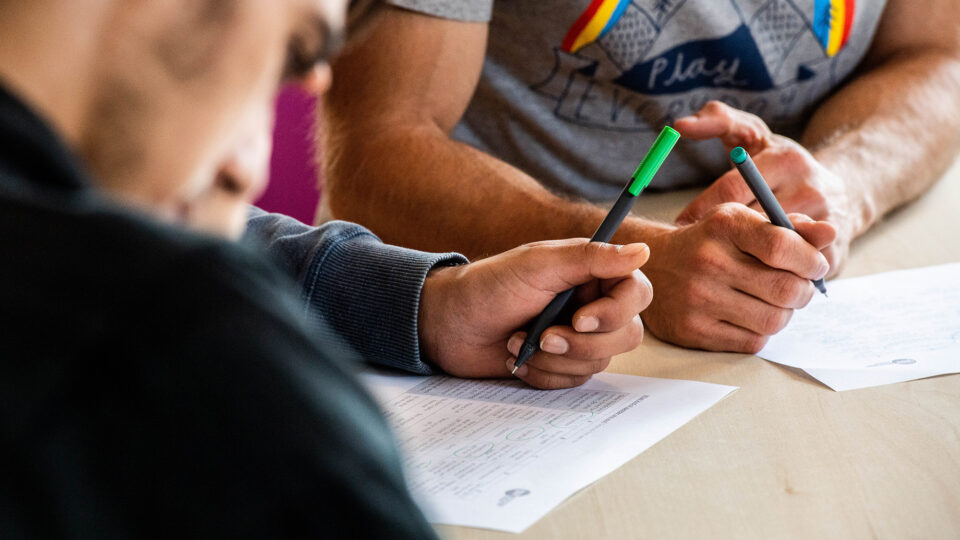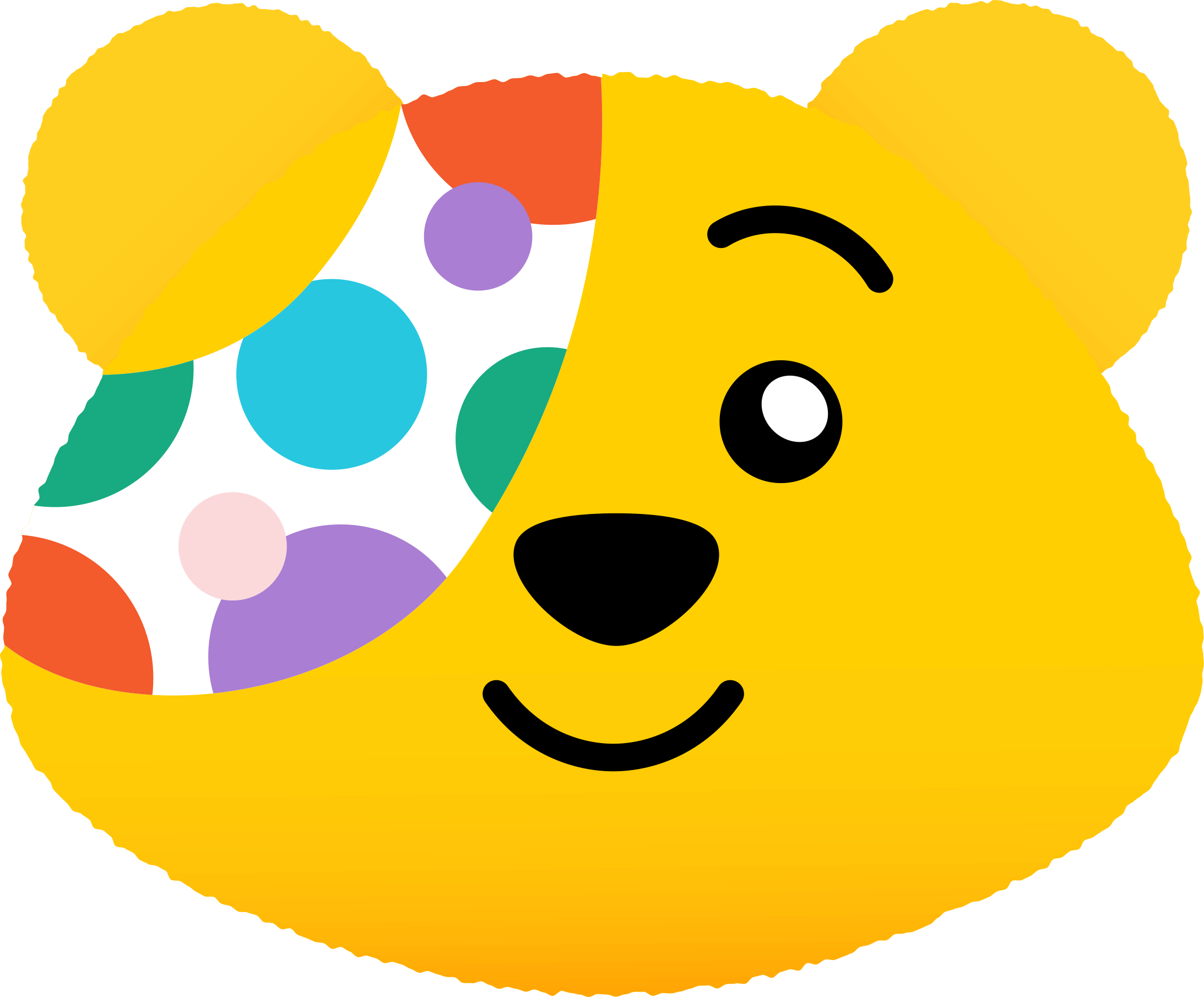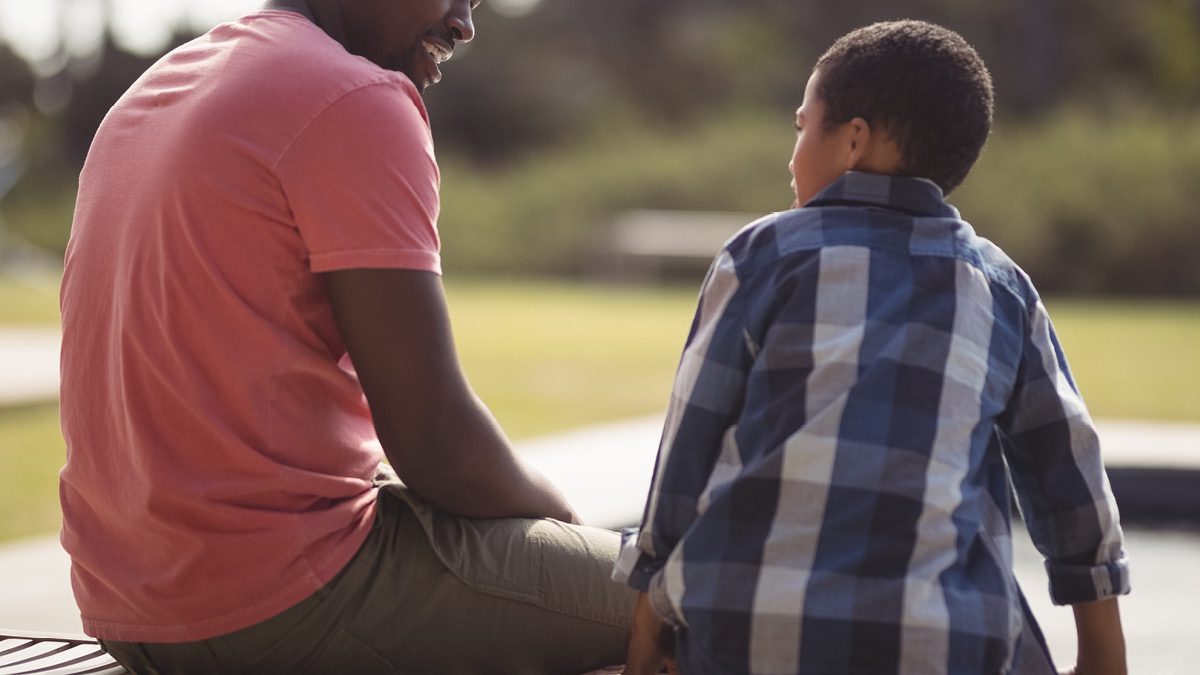
Positive Relationships Matter
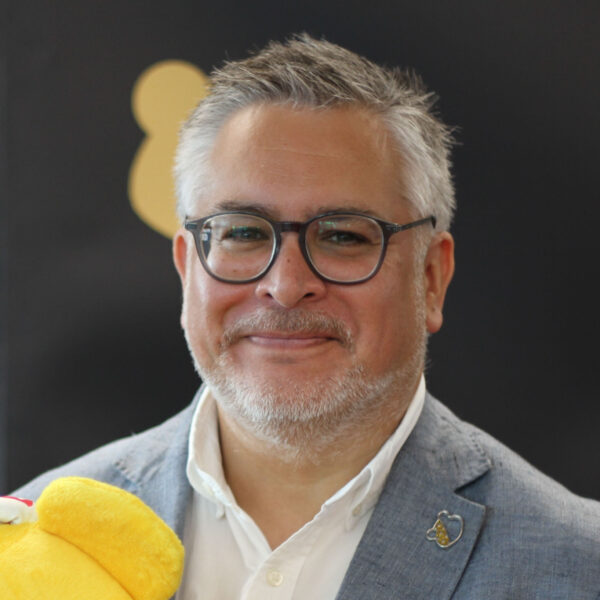
by Tony Okotie
Director of Impact- Grants
This year, for Mental Health Awareness week (13-19 May), we’re launching ‘The Heaviest Backpack’, our brand-new campaign focusing on young mental health and the power of Positive Relationships.
I am sure most people would agree that the need for positive relationships – for all of us – is unequivocal and a basic need – we are social creatures after all. However, the importance of these positive relationships goes beyond that, as evidenced through a report from our A Million & Me programme , which provided funding to the value of £10 million for early intervention work with children aged between 8 and 13. This validated that Positive Relationships – trusting and safe connections between children and the important people in their lives – are key in helping to prevent the development of mental health challenges.
We see this everyday through the brilliant projects and organisations we fund and in my role, I often talk with fantastic project workers, like Dylan in the Heaviest Backpack film, about their work, and the impact of the support they provide. Quite simply:
Jonathan Bundy, Youth and Community Worker at Valleys Kids“Some of the kids we see walk around with the weight of the world on their shoulders.”
Simply taking time to listen and not judge, to spend time undertaking activities can have a profound impact on young lives, although the impact and influence that this has on the future direction of a young person or child may not be understood for many years. Personally, I remember Alan from when I was a teenager. Alan was a youth worker in the church based youth organisation I was a member of, and he took time to understand me, invest time in me and help with my own self belief. I am still in contact with Alan many years later, and continue to be grateful for his professional skill and care.
Over the next few months and years we’re going to be talking about the importance of positive relationships a lot more, and also continuing to build the evidence base to demonstrate the transformative role that they have, supporting young people to be the best they can be.
We talk Positive Relationships with project worker Dylan from our short film “The Heaviest Backpack”
Positive Relationships in Action at Valleys Kids
An interview with Jonathan Bundy, Youth and Community Worker
We spoke to Jonathan Bundy, a Youth and Community Worker at Valleys Kids, which is supported by BBC Children in Need. We learned more about how the project is there for children and young people to increase their self-esteem, better understand their feelings, and make better decisions around their health.
We see that Valleys Kids support children of all ages, tell us a little about the work you do and support you offer?
We offer two drop-in sessions for 10-12 year olds and 13+, in addition, we run an after school club for under 10s. Our sessions involve arts and crafts, quiet rooms, gaming zones and we’ve even got a great outdoor space with a forest nearby! We have youth volunteers and provide volunteering opportunities for people to get involved with.
Valleys has been going for 45 years now. With our local branch running since 1997. People come back – ones who were here as kids now come back and help as adults!
Jonathan, your quote inspired our campaign, ‘The Heaviest Backpack.’ Tell us a little more about some of the issues children and young people carry in their backpack?
A lot these days are mental health issues – anxiety and stress. The world that they live in today with internet and social media, it creates a lot of expectations on them.
Poverty is also a big issue for half our kids – from not fitting in due to not having the latest phone/trend, to not having a hot meal at home. We actually now feed hot meals in our after school club – this came from a family whose only hot meal a day was the free meal at school, so now we feed everyone.
We also see kids come in with issues at home, including domestic violence, drug abuse and more.
Tell us a little about what goes on at your sessions, and how this helps makes things feel lighter for young people experiencing mental health issues?
We run discussions about things that are going on in the world (such as global warming) and let them open up and talk about what they’re worried about.
For me, our main thing is having good relationships with the kids who come here so that if there’s an issue in their life, they will open up and talk to us. Some kids approach us but we also start the conversations and encourage that.
We’re lucky as we know the community and families, so we know what some of the kids are going through anyway and can help them. We’ve known many of them for years as they’ve attended
Valleys Kids from a young age and we’ve watched them grow up. It helps us know who we can introduce to each other and get them talking.
I used to attend as a kid, and I try to be that listening open ear to them as it was so important to me growing up. I attended as a 13 year old kid, became a volunteer at 16 and have now been a paid member of staff for 17 years.
How does this campaign align with Valleys Kids mission and values?
We’re all about creating good relationships and encouraging those conversations between the kids. We’ll talk to the kids about their worries, but we also encourage parents to speak to their children and teach them ways to approach these conversations at home.
Has the type of support needed changed in recent years? If so, how?
When Valleys Kids first opened, alcoholism and drugs were a huge issue in the community, but now it’s much better. However, mobile phones and the internet have impacted things and it’s very different now. Anxiety has grown massively and kids have more things to worry about – bullying can continue online and they feel like they can’t get away.
Have you noticed any changes in the number of young people needing support in recent years? If so, how do you manage this?
We used to just operate in the small local community, but now kids come here from everywhere – people bring their friends along too. They also come back to us when something happens in their lives.
Within The Valleys, there isn’t a lot to do for young people. Or if there is, it comes at a cost. We take them out for activities for free and for some of them, it’s things they might not usually be able to do. We took some kids to the cinema recently and for some, it was the first time they’d ever been!
BBC Children in Need believes in the power of positive relationships between young people and trusted adults- in your experience, how do positive relationships make a difference?
It really can change their lives. Some kids come just to have fun, but some kids you can tell really need you.
One of our volunteers, we’ll call her X, first came to youth group on her own with no friends. She’d always stick to one of us. We ran a three year project and selected X as one of the people to take part. They had to take a Welsh Heritage site, come up with a new purpose for it and reimagine what the place could look like using Minecraft. It involved doing photography, art etc and we even took the group to Ireland. The group became great friends and throughout Covid, we still met every week to continue this.
This project gave her the confidence to be herself, and now she’s really confident and a very popular volunteer! Many children who come to us don’t have friends when they start coming, and we’ve helped in their journey.
Tell us a little about the impact your work has had on young people in Rhondda Cynon Taff?
We encourage people to do something to look after the area they live in. It gives them a sense of ownership and belonging. We also stay in touch with Valleys Kids who are now mothers and continue to help them navigate motherhood.
Valleys Kids is a BBC Children in Need funded project. What would you say to people who might be considering donating to BBC Children in Need?
Do it – you really are making a difference to people’s lives. Funding is hard to come by, but BBC Children in Need really do support us. Even small things can make a positive impact on a child’s life.
We see your youth sessions aim to give young people a place to be themselves and develop a sense of identity. Tell us a little about why it’s so important to give young people this space to express themselves?
It’s so important as there’s often nowhere else to do it. We provide a safe space for them to come and do whatever they want – even if it’s just to sit in a corner with their friends.
We give young people these opportunities so that they can go on and be the best version of themselves. E.g. we might let a kid use a camera and the freedom/chance to explore, and they end up developing a passion for photography, that they may not have otherwise known about.
What do you find is the most rewarding part about your job here at Valleys Kids?
I love that with a lot of kids, the whole families have gone through Valleys Kids. They feel like family to us. You end up really knowing them, and they know you. And just watching young people thrive – going through school, getting into University etc.
We know that some children carry more than others. If you could send one message to children and young people who might be struggling right now, what would you say?
Talk to somebody that you can trust – a problem shared is a problem halved. Just talk, it’s so important. There’s always people you can talk freely with.
Positive Relationships at The Abingdon Bridge
We spoke with Gary Hibbins, CEO of The Abingdon Bridge in Oxfordshire to find out more about the work they do to champion the wellbeing & mental health of young people and why our campaign, The Heaviest Backpack, is so important.
Tell us about The Abingdon Bridge
My name is Gary Hibbins, I’m the CEO and one of the therapists that work here at The Abingdon Bridge. BBC Children in Need have given us an amazing grant that helps support children aged 13-18 with emotional wellbeing.
We support around 200 people a week from various backgrounds with a wide range of issues. We have an amazing team of therapists and youth workers who can see first-hand the impact and understand children’s needs. We help them to understand the weight that they carry and provide them with ways they can unpack that bag safely.
BBC Children in Need are launching ‘The Heaviest Backpack’ to show that burdens, whether it’s anxiety or problems at home, can weigh children down and follow them everywhere. In your experience what are some of the issues that children and young people have in their backpack?
Over the last few years, there’s been significant events, such as Covid and the cost of living crisis which has had an impact on relationships.
We’ve seen an increase in the number of children and young people coming to us who are burdened by unhealthy relationships at home (domestic violence etc.), young people who have to take on a lot of responsibility and the impact this can have. The cost of living separates people out even further.
We see a lot of young people can’t cope with the weight of their bag, they look to self sooth through unhealthy relationships, drugs, alcohol and self-harm.
They carry a lot of stress and anxiety of the unknown, and anxiety around fitting in and comparison, especially with the digital world. We try to teach them that anxiety isn’t always a bad thing, they can tune into it and learn from it. It’s just when it becomes unmanageable, that’s when it needs to be unpacked.
How does The Abingdon Bridge support young people with their mental health?
We run a number of sessions, such as 1-1 counselling services. Young people come in and we understand that they won’t necessarily take their backpack off straight away – that rarely happens as young people hide this to protect themselves – like a padlock would on a backpack. We let young people tell us as much as they’d like and take things at their pace.
We also have a wellbeing service with trips and taking people out. A big part of removing that backpack is sharing it and getting that sense of belonging. We give young people the opportunity it to commit to something, to get that sense of belonging – it helps hugely.
We also run as ambassador program. Young people who have been through the program come back to help others, share their journeys and map out what future support may look like for them.
One of the biggest things you can help young people to understand is that life is challenging – there will always be bumps along the way. You’re never going to not have some sort of weight to carry,
and sometimes it’s normal and you need it. But it becomes unhealthy when it’s crippling you and you don’t know how to unload it.
A backpack has many compartments and zips. We like to get young people to understand what they need to carry, and what parts they can unpack and work through. We help young people regulate themselves and understand what they can take out of their bag and what they can get rid of. Also what they’re able to deal with right now and what they need support with in the future.
How does this campaign align with The Abingdon Bridge’s mission and values?
There’s a huge synergy. Watching the campaign trail made me think of many young people we see who feel like that. Often the backpack is invisible to others around them – only the young person feels the weight.
We are really about supporting young people and helping them thrive and reach their full potential. This can only be done when you’re not carrying weight of the world on your shoulders.
Has the number of young people needing support changed in recent years? If so, how have you managed this?
It’s been really interesting. I’ve been here 7 years and seen a huge shift in the numbers of children and young people coming forward and seeking help. There’s been a big change in talk around mental health, but a lack of resources on how people can help themselves. Without BBC Children in Need, we wouldn’t be able to provide the huge number of services that we do.
A lot of young people think they’re the only person experiencing these issues and don’t know how to handle it. They’re weighed down by really heavy backpacks but don’t know how to deal with it. We help them to understand that a lot of it can be dealt with if you have the tools to deal with it in the right way, and sharing how they’re feeling with someone really helps.
Waiting lists and referrals can sometimes leave young people feeling more anxious whilst they wait 6+ months. We aim to help young people understand how they’re feeling and how they can unpack their backpacks and how they can deal with it. On Tuesdays and Thursdays, we open up a space in a local town (with pool tables etc). We get around 30 young people turn up and they’re probably some of the most vulnerable young people who come from horrific experiences/trauma. We provide a safe space with trusted adults and let them just be a kid again – you can visibly see the weight come off their shoulders.
BBC Children in Need believes in the power of positive relationships between young people and trusted adults- in your experience, how do positive relationships make a difference?
Having the right relationships, whether therapeutic or just general positive relationships are fundamental in building trust and providing safe spaces. For us, this makes a huge difference. A lot of young people we support don’t have this in their lives, so it’s fundamental for us in ensuring young people can be themselves, be open and feel safe.
Our young ambassadors want to make a difference because of their positive relationships and the impact it had on them whilst at the projects. We still get people who pop in and say hello who went here 4 years ago! We also recently had a 21 year old lad do a half marathon based on his experiences of being here when he was 16, to raise money to help give back.
What do you find is the most rewarding part about your job here at The Abingdon Bridge?
We had a young lad, we’ll call him T. T come from a loving family but his dad passed away on Christmas day. It’s been a very challenging time for him. He’s spent many months not understanding the weight he was carrying in his backpack and how to regulate himself. This led to him getting involved in crime and risky behaviours. We sat down with him, and helped him understand the weight he was carrying and how this was making him feel.
Flash forward a few months, he stood up and said he wants to help make a difference to the next generation and people who have been through similar experiences. He now wants to focus his studies on helping others. He’s even now going to sit his A Levels after previously being excluded from school.
When you’ve got young people who give their time without being asked, feel a desire to improve communities they live in, it’s really rewarding. You can see they feel a sense of belonging and purpose. That’s what we do it for. Seeing young people thriving in the communities they live and how can influence and bring change.
I didn’t feel that growing up (due to trauma, loss etc). It makes or breaks you. It made me realise I want to improve the lives of young people – I want to help them as it helps me. It still inspires me to this day.
We know that some children carry more than others. If you could send one message to children and young people who might be struggling right now, what would you say?
I would say:
The burden of the bag, and the heaviness that you feel, will pass. The more that you can take time to share some of the weight sometimes with a trusted adult will help you. Maybe start with a little zip on the side. Take it step by step. Check your bag and see what can be left behind that day.
Don’t ever limit what you feel like you can achieve. You can achieve everything you imagine. Belonging and committing yourself to something can make a difference, and that’s a great place to start.
A massive thank you to BBC Children in Need for leading on this and [being] at the forefront of children and young people’s mental health across the country. I’ve seen first-hand the difference it can make.
We’re really honoured and thrilled to take part in this campaign.
